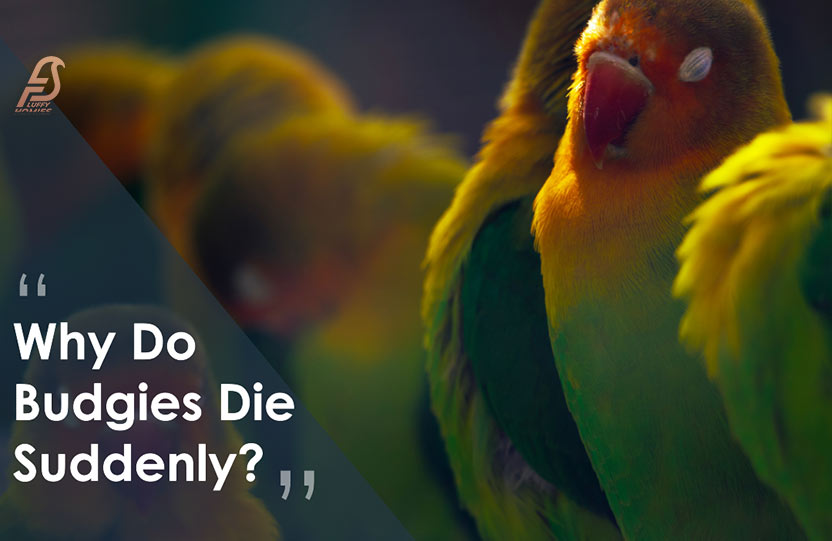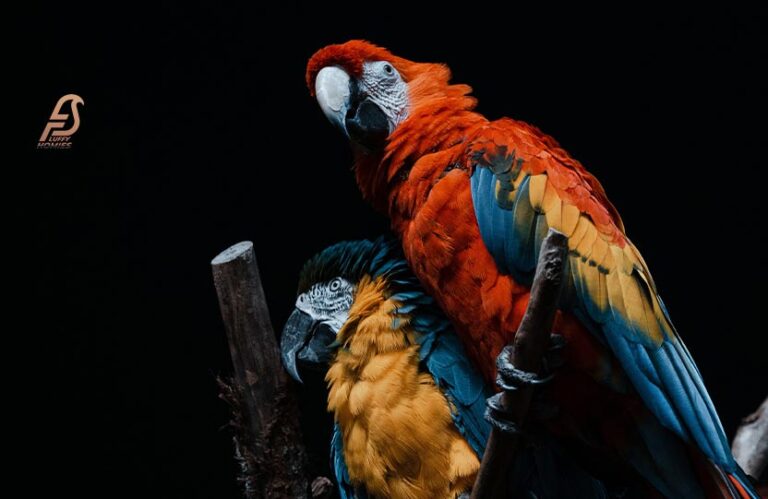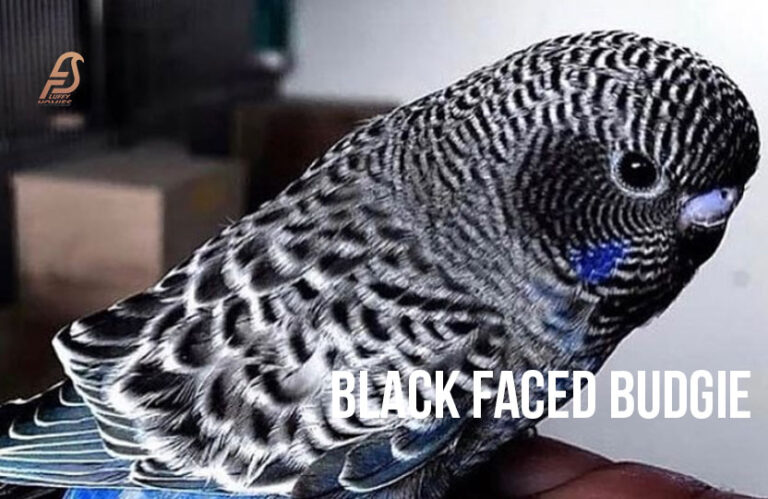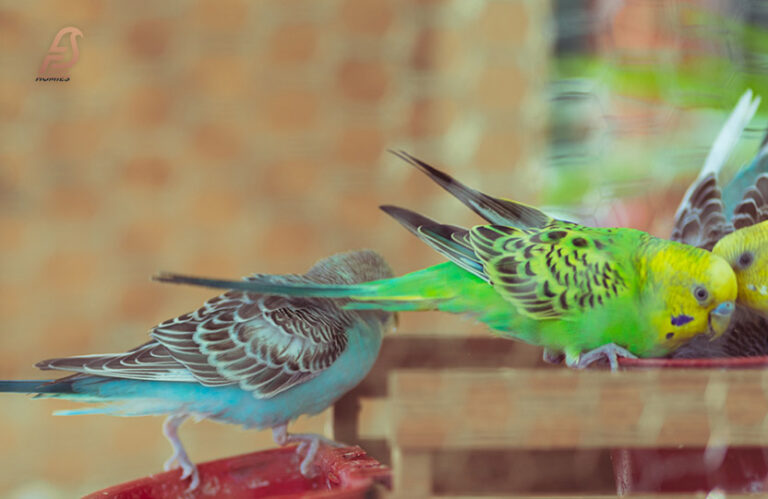Why Do Budgies Die Suddenly? (My Budgie Died Overnight 2024)
Keeping budgies like lutino as pets brings joy and companionship. But there are also some shocks attached to them. Like budgies die suddenly and owners don’t have any idea why their beloved budgies die suddenly?
However, it can be heartbreaking when these delightful birds pass away suddenly without any apparent reason.
In this blog post, we will explore the common causes of sudden budgie deaths and provide essential preventive measures to ensure the health and well-being of your feathered friends.
Why Do Budgies Die Suddenly?
There are many reasons behind the sudden death of budgies. As an honest owner, you should know all about them and minimize them.
Respiratory Issues
Respiratory problems can be a leading cause of sudden budgie deaths. These birds have sensitive respiratory systems, and exposure to airborne toxins, pollutants, or irritants can lead to severe respiratory distress. Common culprits include:
- Cigarette smoke
- Household cleaning products
- Scented candles
- Aerosol sprays
Ensuring a clean and well-ventilated environment for your budgie can significantly reduce the risk of sudden respiratory failure.
Infections and Diseases
Budgies are susceptible to various infections and diseases, some of which can progress rapidly and result in sudden death. Avian diseases such as:
- Psittacosis
- Avian influenza
- Aspergillosis
- Obesity
Can cause fatal complications if left untreated. Regular avian veterinary check-ups, a balanced diet, and maintaining good hygiene can help prevent and detect potential health issues before they become life-threatening.
Toxic Substances
Budgies have a curious nature and may inadvertently come into contact with toxic substances within their environment. Common household hazards include:
- Lead-based paints
- Pesticides
- Certain houseplants (e.g., lilies, philodendrons)
- Some human foods (e.g., chocolate, avocado)
Keeping budgies in bird-safe areas and being mindful of potential hazards can help minimize the risk of accidental poisoning.
Trauma and Injury
Accidents happen, and budgies are not immune to physical injuries. They may injure themselves by:
- Colliding with windows or mirrors
- Getting trapped indoors
- Falling from perches
In some cases, these injuries can lead to internal bleeding or organ damage, resulting in sudden death.
Creating a safe and bird-proofed living space, including placing decals on windows and removing potential hazards, can help prevent fatal accidents. This makes them destructive also.
Also Check: How Much Do Budgies Cost?
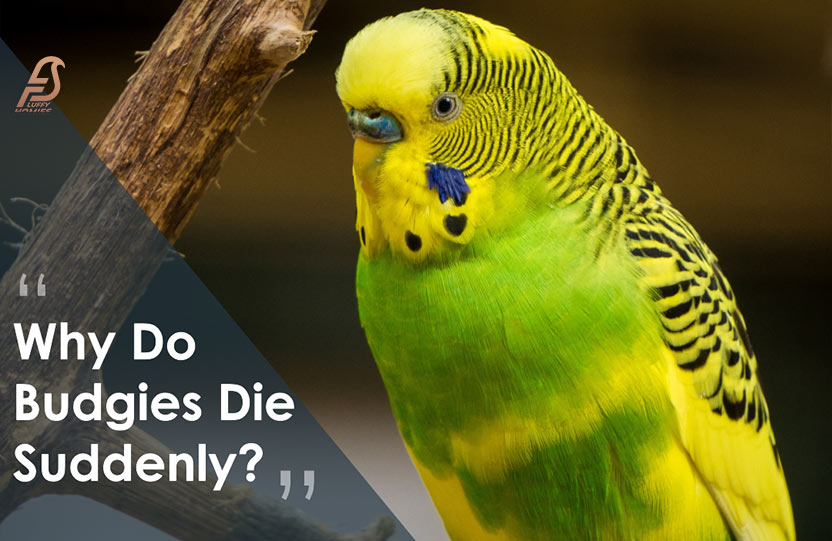
Genetic Factors and Aging
Sometimes, budgies may be predisposed to certain genetic conditions or have underlying health issues that manifest later in life.
Some genetic conditions, such as heart defects or liver problems, can lead to sudden deaths. Additionally, advanced age can weaken a budgie’s immune system, making it more susceptible to infections or organ failure.
Regular health monitoring and providing a balanced diet enriched with nutrients can promote overall well-being and potentially extend their lifespan. Just like budgies, lovebirds also die suddenly.
How Do I Know My Budgie Is Dying?
Recognizing the signs of a dying budgie is crucial for providing appropriate care and seeking veterinary attention when needed.
While budgies are adept at hiding signs of illness or distress, attentive owners can observe certain changes that may indicate a budgie is nearing the end of its life.
Here are some common signs to look out for:
Lethargy and lack of energy
A budgie that is suddenly less active, spends more time sitting still or appears weak and tired may be showing signs of declining health. Lethargy also change the color of budgies poop.
Loss of appetite and weight loss
A budgie that refuses to eat or has a significant decrease in food consumption, resulting in noticeable weight loss, could be experiencing serious health issues.
Labored breathing or wheezing
Difficulty breathing, rapid breathing, or audible wheezing sounds may indicate respiratory problems or other underlying health conditions.
Changes in droppings
Observing changes in the color, consistency, or frequency of a budgie’s droppings can be a sign of gastrointestinal distress or organ dysfunction.
Unusual behaviors
Unusual or abnormal behaviors such as excessive sleeping, reluctance to move, sitting at the bottom of the cage, or prolonged periods of fluffing up feathers can be indicative of a budgie’s deteriorating health. This also include of budgies eating their poop.
How Do Budgies Act When Dying?
Changes in Physical Activity
A budgie that is nearing the end of its life may display significant lethargy, with a discernible drop in its level of physical activity. There is a possibility that the bird will remain seated for extended periods of time and will be reluctant to move.
Altered Eating and Drinking Habits
A crucial symptom that a budgie is getting close to the end of its life is a loss of hunger. There is a possibility that the bird will avoid eating and will refuse to consume its preferred treats or seeds.
Budgies that are nearing the end of their lives frequently diminish the amount of water they consume, which might result in dehydration. It is of the utmost importance to keep check of their water dish for any abrupt changes.
Changes in Vocalization
Budgies, which are often chatty and noisy birds, may become extremely quiet as they get closer to the end of their life.
This may be accompanied by a decrease in their chirping or vocalization. The presence of distress can be indicated by a discernible decrease in the amount of chirping and vocalization.
Physical Signs of Decline
If a budgie is having difficulty breathing or if there are visible changes in the rhythms of its respiration, this could be an indication that it is in distress. It is possible that this will reveal itself as open-mouth breathing or tail bobbing.
Alterations in the Condition of the Feathers As the health of a budgie deteriorates, the feathers may acquire a ruffled or disheveled appearance. In dying budgies, it is usual to observe a lack of preening and grooming to be a prevalent behavior.
Isolation and Withdrawal
Budgies are gregarious creatures, and when they are sick or nearing the end of their lives, they may withdraw from their cage mates or human companions in order to seek refuge in solitude. During this time period, it is usual for people to find themselves seeking solitude and seclusion.
Loss of Balance and Coordination
Budgies that are ill may have trouble maintaining their balance and coordination, which can make perching difficult for them. It is possible that this is the result of neurological problems or weakness that are related with the loss in health.
Physical Appearance Changes
When budgies are getting close to the end of their life, they frequently experience emaciation, which is characterized by a gradual loss in weight. It is possible to perceive a noticeably thinner or more fragile appearance.
Eyes and Beak Changes
Eyes That Are Partially Closed Budgies may occasionally keep their eyes partially closed as they become weaker, which is a sign that their energy levels are decreasing.
Alterations in the Color of the Beak A beak that is pale or discolored may be an indication that the animal’s health is deteriorating. Keeping a close eye out for any peculiar shifts in the color of the beak is essential.
Critical Signs
A budgie may become unable to stand or perch during its later stages, and it may spend the most of its time lying down. This is referred to as inability to stand.
In the end, a dying budgie may lose consciousness and become unresponsive, which is an indication that its life has come to an end.
Why Your Budgie Died with Eyes Open?
However, there are instances in which budgies may pass away with their eyes open, which can be a terrible sight to behold.
The occurrence of this phenomenon is not unusual and can be linked to a number of different circumstances. Below are some of the possible explanations for this:
Sudden Cardiac Arrest
In the same way that other animals might have sudden cardiac arrest, budgies can also undergo sudden death that is unexpected and unanticipated.
When the heart experiences cardiac arrest, it ceases pumping blood adequately, which results in the cessation of blood circulation. At the time of death, the body of the budgie may remain in a calm state, with its eyes open, as a consequence of this.
Severe Health Complications
It is possible for budgies to suffer from severe underlying health problems, which can result in their passing unexpectedly.
Among these consequences are the possibility of organ failure, internal bleeding, or infections throughout the body. Given the severity of the situation, it is possible that the budgie will finally pass away with its eyes exposed.
Stress or Trauma
Extreme stress or trauma is another factor that may contribute to the death of a budgie and force them to talk in sleep.
It is possible for a budgie to experience lethal shock or discomfort as a result of stressors such as confrontations with predators, loud noises, or sudden changes in its environment. This can result in the budgie’s untimely death with its eyes open.
Can Budgies Die of Loneliness?
As sociable creatures, budgies thrive when they are in the company of their flock or a mate with whom they have a strong attachment.
There is a possibility that extended loneliness and social isolation can have a harmful impact on their well-being and possibly even their health, despite the fact that they are able to tolerate short periods of time spent alone.
The following is a list of reasons why budgies may be influenced by feelings of isolation:
Depression and Stress
Budgies are birds that are both highly intelligent and incredibly sociable. Boredom, anxiety, and depression are all symptoms that can develop in people who are deprived of social connection.
The emotional emotions that they are experiencing can cause them to experience stress, which can weaken their immune system and make them more prone to health problems.
Lack of Stimulation
Budgies are birds that are naturally enthusiastic and inquisitive. loss of companionship can lead to a loss of mental and physical stimulation, which can result in boredom and a lifestyle that is characterized by a lack of activity.
Weight gain, muscle weakness, and a general decline in vitality are all potential outcomes of this condition.
Modifications to Behavior
Budgies that are lonely may display odd behaviors such as excessive vocalization, self-destructive habits like as plucking their feathers, or violent tendencies. Their mental and physical health may become even more compromised as a result of these habits.
Can Budgies Kill Themselves?
Budgies like purple parakeets are generally not prone to intentionally causing harm to themselves.
However, they can unintentionally injure themselves if their environment is not bird-proofed or if they are exposed to potential hazards.
Some examples include:
Unsafe Cage Accessories
Sharp or hazardous cage accessories, such as sharp perches, can cause injury to budgies.
Ensure that all cage accessories, including perches, toys, and food/water dishes, are safe and free from potential hazards.
Toxic Substances
Budgies may accidentally ingest toxic substances if they have access to household chemicals, certain houseplants, or unsafe foods.
Ensure that their environment is free from toxic substances and that they are not exposed to harmful materials.
Unsafe Flying Areas
Budgies require a safe and bird-proofed area for an out-of-cage time. Unprotected windows, open doors, or spaces with potential dangers, such as ceiling fans or uncovered mirrors, can pose risks to their safety.
Always supervise and create a secure environment for your budgie when they are out of their cage.
Inadequate Cage Size
A cramped or overcrowded cage can lead to stress, physical injuries, and behavioral problems in budgies. So, that’s why you must know how many budgies can you keep in a cage.
Ensure that the cage is spacious enough for your budgie to move, stretch its wings, and engage in natural behaviors comfortably.
How Do You Keep a Budgie Alive?
Keeping a budgie like anthracite budgie alive and thriving requires proper care, attention, and a suitable environment.
Here are some essential tips to ensure the well-being of your budgie:
A Nutritious Diet
Provide a balanced diet consisting of high-quality commercial budgie pellets, fresh vegetables, and occasional fruits. Avoid feeding them toxic or harmful foods and ensure a constant supply of clean, fresh water.
A Spacious and Stimulating Cage
Provide a spacious cage that allows for adequate flight and exercise. Include perches of varying sizes and textures, along with toys, swings, and puzzles to keep them mentally and physically active.
Regular Veterinary Check-ups
Schedule regular visits to an avian veterinarian for check-ups, vaccinations, and preventive care. Early detection of any health issues can greatly improve the chances of successful treatment.
Social Interaction
Budgies are social birds and benefit from companionship. If possible, consider keeping them in pairs or small groups. If you have a single budgie, spend time interacting with them daily to provide social stimulation.
Environmental Enrichment
Create an enriching environment with toys, puzzles, and foraging opportunities to keep your budgie mentally stimulated. Rotate and introduce new toys regularly to prevent boredom.
Maintain a Clean Environment
Clean the cage regularly to prevent the build-up of waste, bacteria, and parasites. Provide fresh bedding, and ensure good ventilation to maintain clean and healthy air quality.
Exercise and Out-of-Cage Time
Allow your budgie to have regular supervised out-of-cage time in a safe and bird-proofed area. This allows them to stretch their wings, explore, and engage in natural behaviors.
Conclusion | Why Do Budgies Die Suddenly?
Any owner can be devastated and distressed by the unexpected loss of a budgie. Sudden death in budgies can occur for several reasons, such as respiratory problems, infections, illnesses, toxic substance exposure, trauma, injury, aging, and genetics.
In the event that your budgie is sick, it is important to know what to do and when to call a vet. Knowing the typical causes and symptoms can help you do just that.
This page has covered a lot of ground, including the most prevalent reasons for budgie deaths, how to tell if a budgie is about to die, answers to frequently asked questions, and how to keep budgies healthy and happy for as long as possible.
FAQs | Why Do Budgies Die Suddenly?
Why did my budgies die suddenly?
Budgies can die suddenly due to various reasons, including respiratory issues, infections, and diseases, exposure to toxic substances, trauma and injury, and genetic factors or aging.
Can budgies die from stress?
Yes, budgies can die from stress. Stress can weaken their immune system, leading to illness and even death. It is important to provide a calm and comfortable environment for budgies to minimize stress-related health issues.
What can cause a bird to die suddenly?
There could be various reasons for a bird’s sudden death, including illness, injury, stress, or age-related factors. Without further information, it’s difficult to determine the specific cause. Consulting a veterinarian may provide more insight into the circumstances surrounding your bird’s passing.
What to do when Budgie dies?
When a budgie dies, it is important to handle the situation with care and sensitivity. You can consider burying the bird or having it cremated, and take time to grieve and remember your budgie.
Why did my bird die for no reason?
It is not always easy to pinpoint what causes a bird to die suddenly. Factors such as preexisting health conditions, stress, environmental hazards, or disease could be to blame. The precise cause of your bird’s untimely demise can be better understood with the help of a veterinarian’s postmortem examination.
